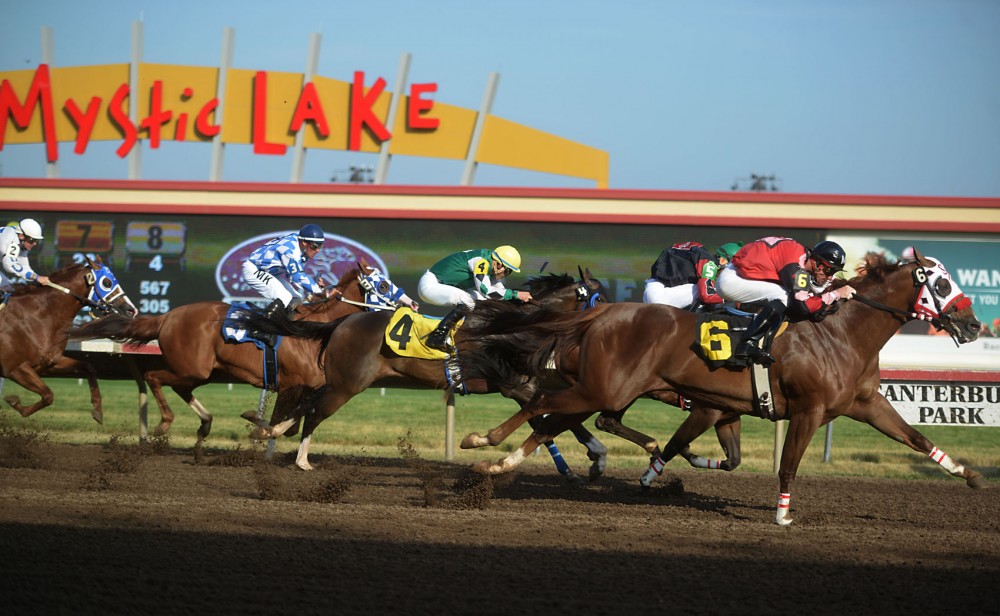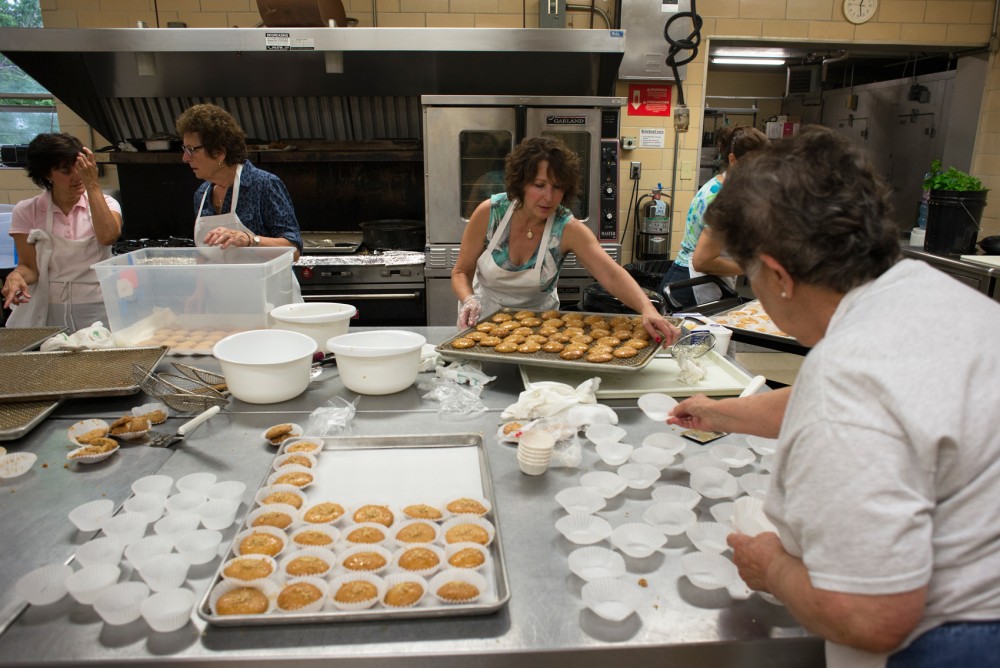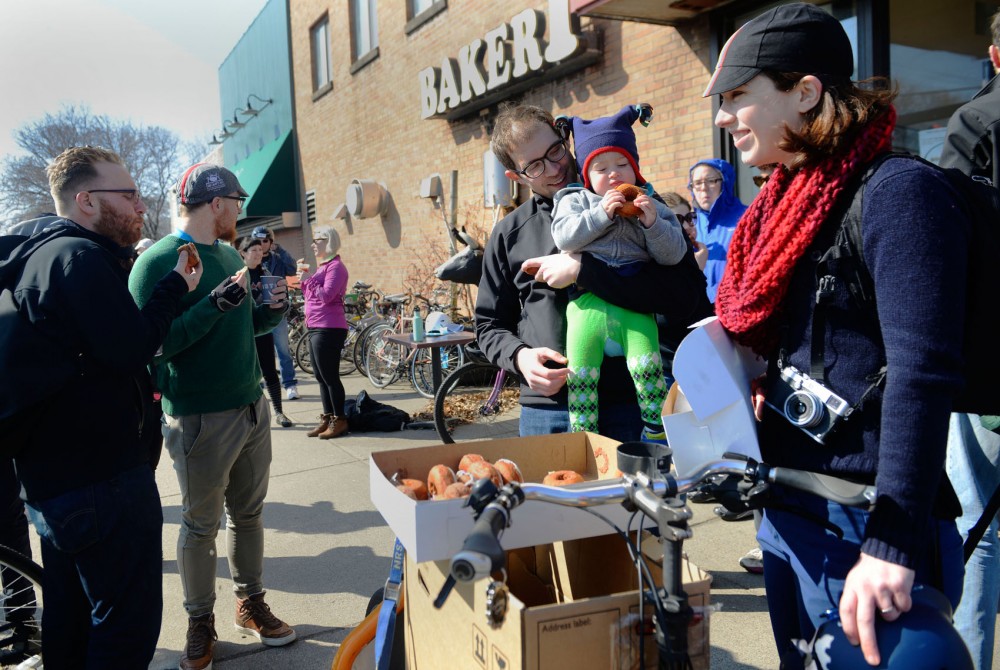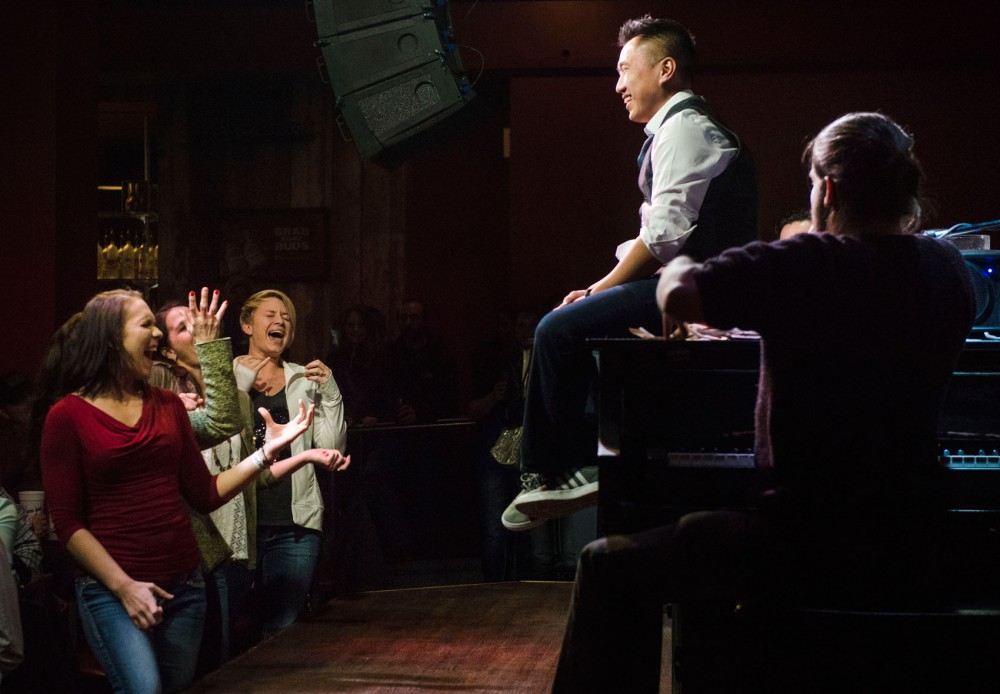It begins the way it does at tracks around the country — Belmont, Arlington, Churchill. A man in red livery and a black helmet calls the horses to post on a medieval-looking bugle.
As the all-to-familiar brassy notes echo through Canterbury Park, Lynn Deichert, who’s been playing that fanfare for “longer than [he] can remember,” lowers his horn. His upper lip is just beginning to chap — it’ll be worse by the night’s 10th race.
Deichert’s horn is a part of the holdover tradition that seamlessly mixes with the likes of electronic betting booths and a diverse clientele of families, grizzled regulars and twenty-somethings looking for a good time. Nothing illustrates the track’s combination of new and old better than one of the escort riders checking her phone atop a chestnut brown mare.
Thursday, with its dollar admission and cheap drinks, is by far the most packed night and draws the most youthful crowd. But by any night’s seventh race, when the libations have been flowing through the bettors’ ups and downs, there will be some cadre of bros clamoring to see the race results through double vision. “Did we all win?” a double-fister queries, spilling domestic on his Nikes.
When I arrived before the first race, one for quarter horses, I was taken under the wing of Michelle Benson, a media assistant at Canterbury whose family runs the horse-specializing Wood-Mere Farms.
Her family used to race horses, but when Canterbury closed in 1992, with live racing returning in 1994, they went into breeding. Benson’s been a part of Canterbury “since the womb.”

Into the belly of the beast we went, entering the basement level from the winner’s circle — that’s where the winning jockey gets his or her (there are a few females on the jockey roster) moment of glory.
Benson had to put a GoPro camera on jockey Juan Rivera before the third race for a promotional video. I found myself smack dab in the middle of what was a bit like an equine green room — guys washing off bridles, a nearby room with all of the colorful silks, a security guard shooting the breeze with a chef who proclaimed himself “the best in Canterbury.” In the middle was the desk of an old, red-nosed, gold-jewelry clad gent who had something to do with weighing-in the jockeys before races.
While Benson was waiting on Rivera, she told me to “go talk to Derek, he’s one of our Hall of Famers.”
Derek Bell was wearing glossy jockey boots and glowing white jodhpurs, the brightness offset only by the big ol’ chaw he had sprouting from his lower lip.
A weathered face and tired eyes looked up at me: “Whaddya wanna know?” he said, punctuating the sentence with a stream of brown tobacco spit.
Most of the luster is gone for Bell, racing horses and the excitement he brings to the crowd outside no longer differentiates his job from others.
“Some days it’s great, some days it sucks,” Bell said.
The “sucks” part probably has something to do with the time he spent in litigation with racing authorities in Florida after getting embroiled in a race-fixing scandal.
At this point, Rivera came out with the GoPro cam on. Bell noticed.
“I bet it’ll look good when I go flying by you,” he said to Rivera. “Wait, does it pick up audio? Well, I’ll be yelling, ‘Eff you,’ on the way by, too,” Bell said with a laugh.
Bell won the next race atop Machorina, passing Rivera along the way.
As he was walking back to change silks, Bell caught my eye, smirking as he said, “And that’s how you do that.”
He won the following two races.
Of course that meant that by the time I thought it’d be a good idea to bet on Bell, one of Canterbury’s all-time leaders with earnings in the $19 million area, he didn’t even show. That’s probably the most important lesson in horse betting — just when you think you’ve got an inkling as to what’s going on, all goes to hell.
There’s no such thing as a sure thing.
Up close, all these powerful beasts look capable of the exceptional, with veins popping out the sides of their flesh, seemingly squeezed to the surface by the masses of muscle that make these animals equally beautiful and frightening.
All of the workers on the track wear padded vests to absorb potential impact.
Larry Davila, the man who hits the starting button by the gates, knows this all too well.
He speaks in what sounds like a state of laryngitis; back in the day, a horse nailed Davila right in the throat, leaving him with a perpetual rasp.
He’s another of the colorful characters that make a night at the track so memorable.
The old-timers sitting studying their forms, the lil’ tykes playing in an impromptu sandbox by the music stage formed by spillover dirt from the track, the pageantry of the pre-race paddock promenade, the cumulative roar of “go” and “no” forming a wash that’ll quickly turn to euphoria or despondence in the last furlong — that’s the allure of a balmy night in Shakopee.
First-timer tips:
-Bet small and spread out; hedge your bets.
-Familiarize yourself with the racing forms; they’re a wealth of information. For example: When picking an Exacta, “box it,” or double the bet so that regardless of the finishing order, if you’ve picked the right horses, you get a payout.
-Bring some binoculars to see the far side of the track.
-Odds will change as bets are placed, so don’t wager too early, but don’t wager too close to post, if the lines are long you might not be able to place it in time.
Glossary of terms:
Exacta: Bet that picks the order of the top three finishers
Jockey: The men and women who race horses, generally around 5 feet tall and 120 pounds
Jodhpurs: Riding pants
Mare: Mature female horse
Post: When horses are led to the starting gates, pretty much the racing equivalent of NASA’s “T-minus 10…”
Quarter horses: Think of a 100-meter sprint in track and field — these horses are bred for quick bursts of speed.
Silks: The colors worn by jockeys that reflect the horse’s owner
Show: A horse coming in first, second or third












